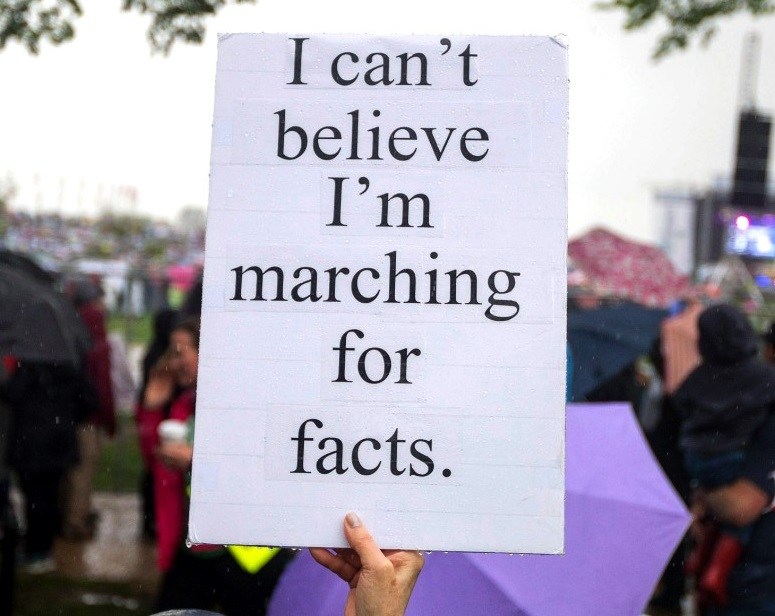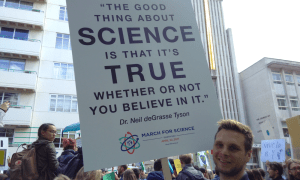And after the UNFCCC Bonn climate talks: An appetite for disruption

By Daniel Morchain

Abiy Getahun/Oxfam: Photo credit
Will you take a walk with me? I’d like to tell you what I learned in Bonn at the UNFCCC COP a few days ago. But first I want to look back. Seven months ago, hundreds of thousands of people worldwide participated in a ‘March for Science’. If I had been near one on April 22nd I would have taken part, but my poster would’ve taken a normative angle, not a positivist one, as so many did. In other words, I’m critical of academia and of giving the – wrongfully perceived – exactitude of science a carte blanche to determine our future. While our post-truth reality is in itself a case for supporting academia, we would be wise to recognise that research today is not infallible, and indeed it is often biased or not inclusive enough of knowledge sources considered insufficiently rigorous (e.g. traditional knowledge, or experiential knowledge from civil society organisations, including women’s organisations).
Consider, for example, who participates (and doesn’t) in science. World Bank figures show that 10,442 ‘scientific and technical journal articles’ relevant to climate change policy and practice were produced in 2011 by researchers in rich countries, compared to 1,323 by researchers in the Southern ones (Bilcharska et al, 2017). If academia wants to be relevant for decision-making in the global South, shouldn’t it make more efforts to level the playing field? Why should, say, the Kenyan government buy into findings that have not been produced in collaboration with its own institutions, expertise, and knowledge?

Environmental and political activist George Monbiot highlights another point relevant to the debate on bias in academia (and thinktanks): In 1998 he wrote ‘there is scarcely a science faculty in the United Kingdom whose academic freedom has not been compromised by its funding arrangements’; later in 2004 ‘the scientific establishment is rotten from top to bottom (and) riddled with conflicts’; and finally in 2013 ‘most of the so-called thinktanksâ¯flatly refuse to reveal their interests’ (while many are funded by corporate interests including tobacco).
Despite these inconvenient truths, according to Peter Bothum virtually all of the people who took part in the March for Science considered ‘encouraging public officials to make policies based on scientific facts and evidence’ to be very important. In contrast, only two thirds were motivated to march for ‘encouraging diversity and inclusion in science’, and less than half expressed an interest in ‘becoming more involved in politics or policymaking.’ This gap is problematic because it reinforces an institution’s established power without challenging and addressing its flaws.
It is also problematic because policymaking isn’t, can’t, and shouldn’t be strictly the result of scientific evidence, as Greenhalgh and Russell argue convincingly. In fact, strictly evidence-based policymaking could lead to cherry-picking and bias. Cultural, emotional, and pragmatic arguments should be considered as important as hard evidence when drafting policies (e.g. evidence would suggest that senior, frail people should wear hip protectors as a preventative action, yet this is not implementable because it is unpopular and it raises questions around dignity and self-determination).

These two states of affairs – those of academia and of the Bonn talks – invite us to make research for development and research for climate change action more meaningful, representative, and influential. It seems to me that we need to move from understanding what the problem is (by now we kind of mostly know it!) to figuring out how to co-create and implement adaptation pathways (this is, today, the trickier bit).
On moving from research to action
Of course, science that influences doesn’t result from just publishing scientific facts and evidence and making them available. Although we know this, we somehow don’t shift our strategy. There are tonnes of advice out there for becoming more effective at influencing. I choose four pointers:
- Keep it short, simple, and very compelling. Spanish philosopher Luis Castellanos says ‘don’t speak in grandiloquent terms; that doesn’t reach people’ (in Spanish). You must draw in and convince the reader before they blink.
- Tell stories, don’t just produce facts. The narrative is important, and we need one.
- Communicating your message, even though small media outlets, is a powerful thing that builds momentum and can lead to policy change, a recent Harvard study concludes.
- It pays to broaden your horizons: ‘a scholar’s broader visibility – both in government and among the public whether through previous government service or publication in broader venues – enhances influence among policymakers more than his or her academic standing’ (from a report cited by Oxfam’s From Poverty to Power blog).
And there’s a fifth one: disruption. That was the growing mood in Bonn. Let’s embrace that!
Disrupt, transform,
Ideally together, but if not alone.
And if you’re from the academia
Don’t hesitate to engage with the media.
Original blog appeared on Research to Action